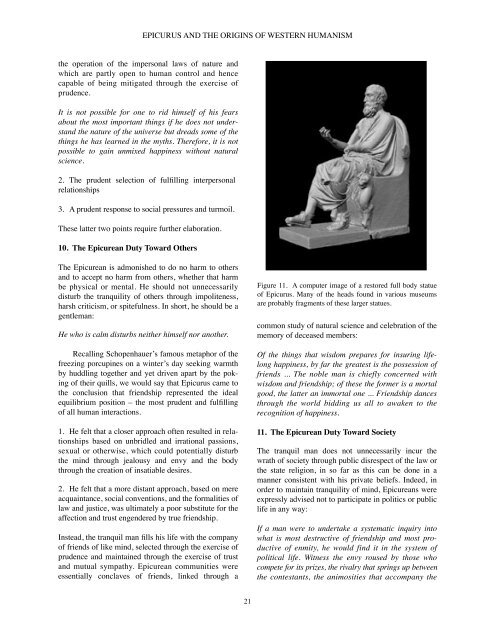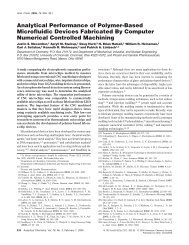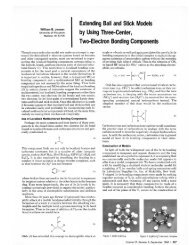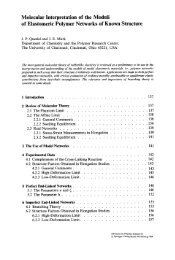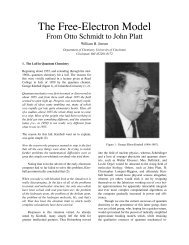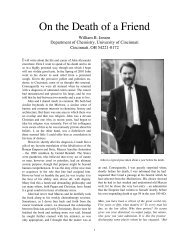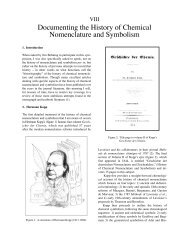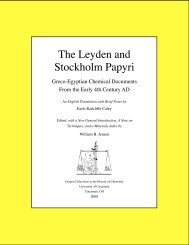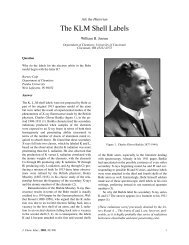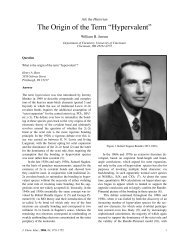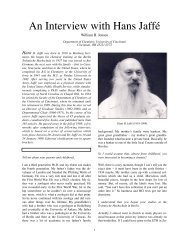Frankenstein's Cat.pdf - University of Cincinnati
Frankenstein's Cat.pdf - University of Cincinnati
Frankenstein's Cat.pdf - University of Cincinnati
Create successful ePaper yourself
Turn your PDF publications into a flip-book with our unique Google optimized e-Paper software.
EPICURUS AND THE ORIGINS OF WESTERN HUMANISM<br />
the operation <strong>of</strong> the impersonal laws <strong>of</strong> nature and<br />
which are partly open to human control and hence<br />
capable <strong>of</strong> being mitigated through the exercise <strong>of</strong><br />
prudence.<br />
It is not possible for one to rid himself <strong>of</strong> his fears<br />
about the most important things if he does not understand<br />
the nature <strong>of</strong> the universe but dreads some <strong>of</strong> the<br />
things he has learned in the myths. Therefore, it is not<br />
possible to gain unmixed happiness without natural<br />
science.!<br />
2.! The prudent selection <strong>of</strong> fulfilling interpersonal<br />
relationships<br />
3.! A prudent response to social pressures and turmoil.<br />
These latter two points require further elaboration.<br />
10. The Epicurean Duty Toward Others<br />
The Epicurean is admonished to do no harm to others<br />
and to accept no harm from others, whether that harm<br />
be physical or mental. He should not unnecessarily<br />
disturb the tranquility <strong>of</strong> others through impoliteness,<br />
harsh criticism, or spitefulness. In short, he should be a<br />
gentleman:<br />
He who is calm disturbs neither himself nor another.<br />
! Recalling Schopenhauer’s famous metaphor <strong>of</strong> the<br />
freezing porcupines on a winter’s day seeking warmth<br />
by huddling together and yet driven apart by the poking<br />
<strong>of</strong> their quills, we would say that Epicurus came to<br />
the conclusion that friendship represented the ideal<br />
equilibrium position – the most prudent and fulfilling<br />
<strong>of</strong> all human interactions. !<br />
1. !He felt that a closer approach <strong>of</strong>ten resulted in relationships<br />
based on unbridled and irrational passions,<br />
sexual or otherwise, which could potentially disturb<br />
the mind through jealousy and envy and the body<br />
through the creation <strong>of</strong> insatiable desires.<br />
2. !He felt that a more distant approach, based on mere<br />
acquaintance, social conventions, and the formalities <strong>of</strong><br />
law and justice, was ultimately a poor substitute for the<br />
affection and trust engendered by true friendship.<br />
Instead, the tranquil man fills his life with the company<br />
<strong>of</strong> friends <strong>of</strong> like mind, selected through the exercise <strong>of</strong><br />
prudence and maintained through the exercise <strong>of</strong> trust<br />
and mutual sympathy. Epicurean communities were<br />
essentially conclaves <strong>of</strong> friends, linked through a<br />
Figure 11. A computer image <strong>of</strong> a restored full body statue<br />
<strong>of</strong> Epicurus. Many <strong>of</strong> the heads found in various museums<br />
are probably fragments <strong>of</strong> these larger statues.<br />
common study <strong>of</strong> natural science and celebration <strong>of</strong> the<br />
memory <strong>of</strong> deceased members:<br />
Of the things that wisdom prepares for insuring lifelong<br />
happiness, by far the greatest is the possession <strong>of</strong><br />
friends ... The noble man is chiefly concerned with<br />
wisdom and friendship; <strong>of</strong> these the former is a mortal<br />
good, the latter an immortal one ... Friendship dances<br />
through the world bidding us all to awaken to the<br />
recognition <strong>of</strong> happiness.<br />
11. The Epicurean Duty Toward Society<br />
The tranquil man does not unnecessarily incur the<br />
wrath <strong>of</strong> society through public disrespect <strong>of</strong> the law or<br />
the state religion, in so far as this can be done in a<br />
manner consistent with his private beliefs. Indeed, in<br />
order to maintain tranquility <strong>of</strong> mind, Epicureans were<br />
expressly advised not to participate in politics or public<br />
life in any way:<br />
If a man were to undertake a systematic inquiry into<br />
what is most destructive <strong>of</strong> friendship and most productive<br />
<strong>of</strong> enmity, he would find it in the system <strong>of</strong><br />
political life. Witness the envy roused by those who<br />
compete for its prizes, the rivalry that springs up between<br />
the contestants, the animosities that accompany the<br />
21


